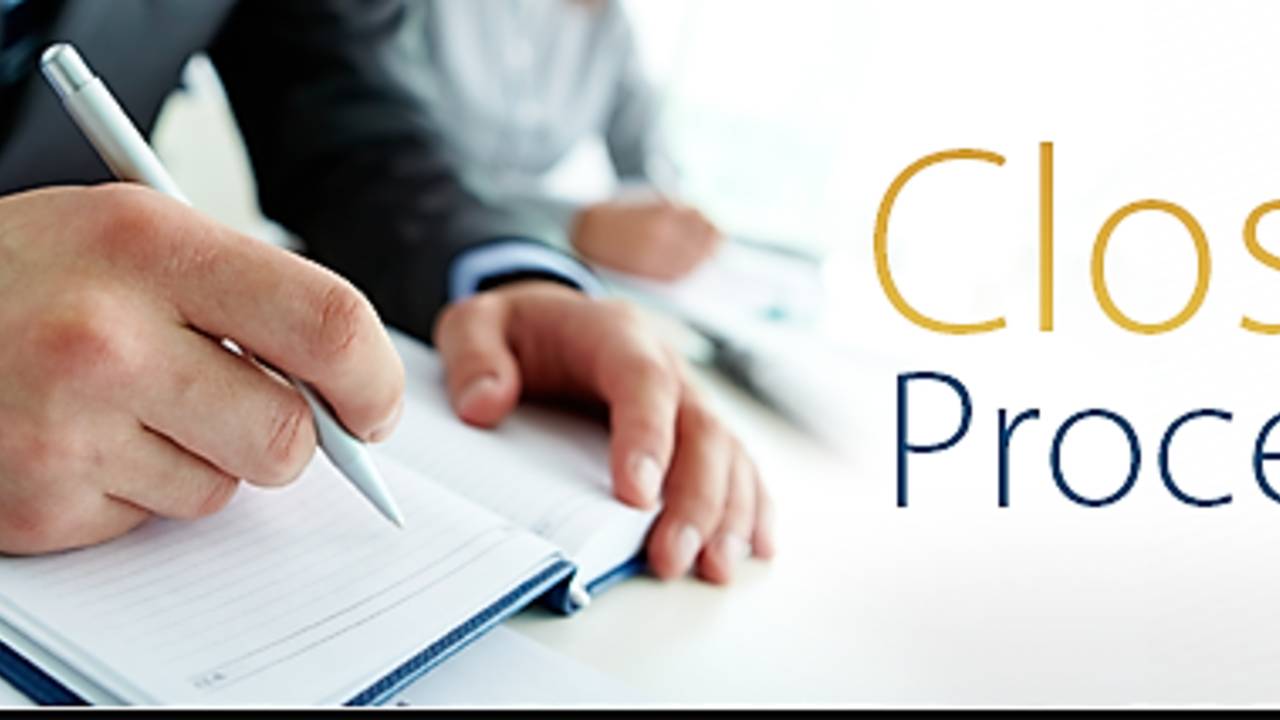Buying a home or property is a process: get pre-approved for a mortgage (if it's needed), start your search, find the right property, make an offer, and it's accepted, have the inspection and appraisal (if needed), all to end with the closing or settlement process. What is the closing process (for some parts of the U.S. it's called settlement), and what's to be expected? Many buyers and sellers forget about this all too important period, so if you're contemplating buying or selling, read on for more information.
What is Closing?
 Closing (or settlement) is the term used to describe the final stage of the real estate transaction. The agreements between the seller and buyer, and the buyer and lender (if a mortgage is needed) are finalized and 'settled.' Documents are signed and exchanged, as well as funds. The seller is paid the purchase price of the property, and in turn, the buyer receives a deed, transfer documents, and a clear title to the property. If a mortgage loan has been sought, funds are distributed from the lender to the buyer, and an agreement is set that the buyer will pay back the loan amount over a set amount of time. This is also the time in which commissions are paid, and any other fees and costs to other parties involved are paid. After everything is said and done, the buyer will walk away with keys to his or her new home.
Closing (or settlement) is the term used to describe the final stage of the real estate transaction. The agreements between the seller and buyer, and the buyer and lender (if a mortgage is needed) are finalized and 'settled.' Documents are signed and exchanged, as well as funds. The seller is paid the purchase price of the property, and in turn, the buyer receives a deed, transfer documents, and a clear title to the property. If a mortgage loan has been sought, funds are distributed from the lender to the buyer, and an agreement is set that the buyer will pay back the loan amount over a set amount of time. This is also the time in which commissions are paid, and any other fees and costs to other parties involved are paid. After everything is said and done, the buyer will walk away with keys to his or her new home.
How to Prepare for Closing?
As a buyer, there are a few things you can do to prepare for the big day. The first is to go over the closing disclosure form if you've applied for a mortgage loan. This form provides all the necessary information regarding your mortgage loan, including the loan's terms (which could be the interest rate and term of the loan), and any additional fees you will pay as a buyer (referred to as the closing costs).
 Another important pre-closing item is to do a final walk-through of the property. Most buyer's contracts will allow a walk-through of the property 24 hours before the closing. If your buyer's contract allows for a walk-through, take the opportunity to actually walk through the property. Check that the seller has vacated or is in the process of vacating (unless of course there is a rent-back arrangement or another agreement). You'll also want to make sure the property is in the condition agreed upon in the contract - which includes any items the seller agreed to fix based on any inspections performed on the property. If you find anything during the final walk-through, address it with your agent or/and the seller's agent as soon as possible. If certain items have not been fixed, or the seller has failed in keeping with the contract, the closing may have to be moved to a later date to accommodate fixes.
Another important pre-closing item is to do a final walk-through of the property. Most buyer's contracts will allow a walk-through of the property 24 hours before the closing. If your buyer's contract allows for a walk-through, take the opportunity to actually walk through the property. Check that the seller has vacated or is in the process of vacating (unless of course there is a rent-back arrangement or another agreement). You'll also want to make sure the property is in the condition agreed upon in the contract - which includes any items the seller agreed to fix based on any inspections performed on the property. If you find anything during the final walk-through, address it with your agent or/and the seller's agent as soon as possible. If certain items have not been fixed, or the seller has failed in keeping with the contract, the closing may have to be moved to a later date to accommodate fixes.
If you're a buyer, and you've applied for a mortgage loan, one important thing to do before closing is to refrain from taking on any additional debt. Although you may be in the final countdown to getting those keys to your new home, you're not on the clear when it comes to your mortgage loan. While you're waiting for all the final details of your loan and home purchase to be hammered out, do not charge up your credit card. Taking on additional large debt before you've actually closed on your home can impact your mortgage loan, possibly even resulting in being denied the loan in the final days before closing. If you have your eye set on new appliances or furniture, wait until you have the keys in your hand before you go on a spending spree for your new home.
On Closing Day
 When the closing day arrives, the excitement of selling your home or buying a new one can make even the most diligent person forgetful. If you're the buyer, you'll want to make sure you have all your important papers and documents: proof of homeowners insurance, home inspection reports, government issued ID, your contract with the seller if you received one, and if you have applied for a mortgage loan you'll want to bring anything the bank has required to approve your loan. It is important to note that your ID must match the name on the property's title at closing, so if you are recently married, you may want to postpone getting a new license until after closing.
When the closing day arrives, the excitement of selling your home or buying a new one can make even the most diligent person forgetful. If you're the buyer, you'll want to make sure you have all your important papers and documents: proof of homeowners insurance, home inspection reports, government issued ID, your contract with the seller if you received one, and if you have applied for a mortgage loan you'll want to bring anything the bank has required to approve your loan. It is important to note that your ID must match the name on the property's title at closing, so if you are recently married, you may want to postpone getting a new license until after closing.
Another important item to bring to the actual closing is your down payment. If you are a cash buyer, you won't need to worry about a down payment and will pay the sale price in full, but if you are a buyer requiring a mortgage loan, your down payment will likely be dictated by the type of mortgage loan you choose. This money will need to be provided in the form of electronic transfer or a certified cashier's check - a personal check won't do for this large purchase.
 Not only will you be signing many different papers on closing day, but depending on which state you live in, you may be joined by a number of other people, including your agent, the seller, the seller's agent, buyer and seller attorneys, someone from the title company, and even possibly a representative from the bank or lender of your mortgage loan. The good news is, once all the signing is done, and nothing has come up during the closing/settlement process, the seller will have sold the property and the buyer will have a new home. If at any time you have questions about the closing process or what might come up, your agent will be able to provide information and insight on all possibilities. Just remember to relax and come prepared.
Not only will you be signing many different papers on closing day, but depending on which state you live in, you may be joined by a number of other people, including your agent, the seller, the seller's agent, buyer and seller attorneys, someone from the title company, and even possibly a representative from the bank or lender of your mortgage loan. The good news is, once all the signing is done, and nothing has come up during the closing/settlement process, the seller will have sold the property and the buyer will have a new home. If at any time you have questions about the closing process or what might come up, your agent will be able to provide information and insight on all possibilities. Just remember to relax and come prepared.
Michael Peron
954-779-6106
Mike@MichaelPeron.com
http://davie-florida.com
https://www.facebook.com/SouthFloridaHomeSolutions


Comments(0)